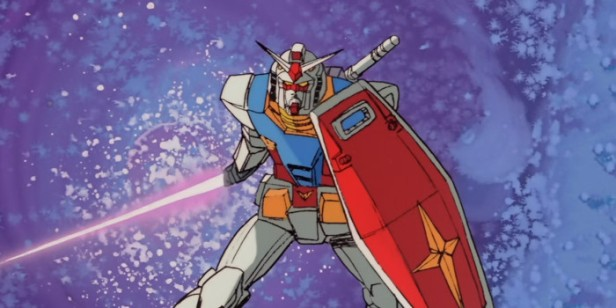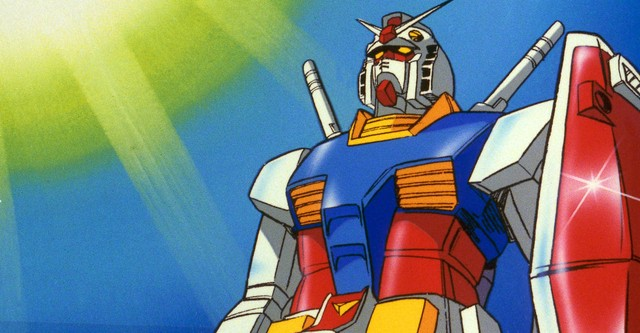Almost all forms of media and storytelling are the result of the time and culture in which they were created. Whether mainstream or counterculture, they have something to say about the sensibilities and values of their surroundings. As such, when I pursue media from far enough back, say more than a decade before I was born, I prepare myself for a certain level of narrative datedness.
This was how I sat down with the original Mobile Suit Gundam. Even having read its manga retelling, The Origin, a number of years ago for a basic familiarity with the core story, I was braced for the series to show its age.

What exactly did I expect from the OG Gundam? I can broadly lay my old media prejudices out. The longer seasons common to older shows can result in esoteric filler. Plenty a franchise that have become similar merchandising juggernauts started with simple, black and white stories to push the products and developed more depth either as the writers found their feet, or when fans who grew up with them took the reins. Some works, you can tell they’re made in a time when it wasn’t really questioned if the cast is homogenous and the female characters are pushed to the sidelines and left underdeveloped, if they existed at all. If we’re talking sci fi, the retro future phenomenon and scientific advances found post-release can sour a work’s worldbuilding in hindsight. Any number of these things, I thought, could mark Gundam as a child of the 70s.
But while the art, animation, sound design and voice acting have all been weathered and worn by the decades, looking purely at the story I was astonished by how modern this 44-year-old anime managed to feel.

Gundam’s story is paced perfectly, with not one of its 42 episodes feeling rushed or wasted. It builds slowly from relatively contained enemy of the week skirmishes to larger battles that play out over several instalments, but even in its early episodic phase it keeps itself feeling serialised by giving the White Base clear objectives and making each encounter feel like an actual step toward them. From Side 7 to Luna II to Earth’s atmosphere to Federation airspace, the ship is always going somewhere. And then, key to it all, it reaches those objectives before the journey gets old, and sets up some new challenges to be the status quo on the way to the next one. There’s no filler. There’s no awkward distinction between one-off episodes and main story ones. And then it ends exactly when and where it needs to.
There are shows coming out today, in this era of hyper-serialised, eight-hour-movie-cut-into-ten-episode streaming shows that don’t balance their main plots and episode structures this well.
The sci fi worldbuilding remains strong to this day. The ever-pressent Minovsky particles do just enough handwaving away the lack of remote drone units and high-end automated detection systems that I never questioned their absence, while the rotating, cylindrical design of the space colonies has echoed forward to the pages and episodes of The Expanse, which I would put forward as the past decade’s strongest sci fi series.

And where I expected a simpler story while the franchise was getting its start, Gundam served me a mature and nuanced war story. Oh, there are clear heroes and villains – the series namedrops Hitler specifically as a comparison for one of its main bad guys – but the series consistently acknowledges that even when fighting for a fascist cause, the enemy soldiers are still human beings. You don’t just get to switch your brain off and see the exploding Zakus as machines. Interior cockpit shots of stunned or terrified soldiers in their last moments are regular enough that you never forget the cost of the war.
Where I have seen works from different eras lean on the machismo and old-fashioned ideas about what emotions are appropriate for a man to show, Gundam takes a comparatively sensitive approach to its main character and his response to being thrust into war. Amuro chafes, understandably, at the strictness of a military he never signed up for. The stress and fatigue weigh on him. He confesses how he can’t help thinking about the enemy pilots he’s shooting down. Talk of being unable to sleep because he keeps seeing his battles when he closes his eyes make a level of PTSD obvious even without spelling it out explicitly.
In this, the day of YouTube video essays picking apart the most accurate and realistic panic attack scenes in movies, Amuro’s struggles in the first half of the series feel like exactly the kind of characterisation these content creators are aching to engage with.
And where there’s male sensitivity, there’s also female empowerment. While the men do certainly outnumber the women, there’s nothing strange or novel in-universe about the lady soldiers in the White Base crew and wider Federation Corps. Sayla is promoted from communications officer to fighter pilot, moved without compunction to the front lines and made the primary combat partner to the protagonist, and it’s the most natural development in the world for her character and the show, done without any huge emphasis.
This is another thing people would be making video essays about, if it were coming out new today.

Which brings me to my actual point. Mobile Suit Gundam could come out today. Oh, the visuals and sound would need to be rebuilt from the ground up, but for the story, there’s almost nothing in the script you’d need to change to make it something palatable to a modern audience. (Maybe just tone down Sleggar a tad, or at least make the rest of the crew less receptive to his bullshit.) And I well and truly believe that an episode for episode Gundam remake would find a fandom that would sing the praises of its takes on war, its portrayal of mental health, and the strength and diversity of its characters. I’ve seen the kind of things that get contemporary fandom engagement going, and this ancient show is full of them all.
I’m not one bit surprised, having now seen the starting point, that Gundam became the cultural phenomenon it is today. I can’t imagine being an anime fan in the 70’s, only ever having watched all the other, lesser 70s anime that did not achieve enough longterm relevance to be part of this conversation, and tuning into a story as layered and precisely told and confident in itself as Mobile Suit Gundam. It must have felt like nothing else ever made. Hell, it still feels like it’s in a league of its own. I wouldn’t throw the word ‘timeless’ around lightly, but this is a tale that has truly gone untouched by time.
I hope I haven’t exposed too much of an ignorance about older, more foundational anime in saying that, or anything else in this essay.
Anyway, that’s my pitch for Gundam. There are plenty of other essays out there that will gush on (rightfully) about the iconic robot designs and the screen presence of Char Aznable, but for my part, I say look past the rust on the production values, cast your gaze deeper and find that the story at the heart of it all runs just as smoothly and feels just as new now as it did in 1979.
(And to Sunrise, I say, how about a fully animated version of The Origin instead of just the flashbacks? Money in the bank, guys. Give me a better way to push this thing to my friends without having to downplay the animation quality. Fiftieth anniversary maybe?)

Leave a comment